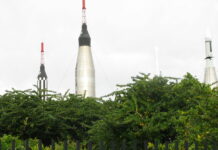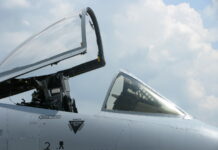Photo credit: DiasporaEngager (www.DiasporaEngager.com).
In an era where the Middle East grapples with the complexities of power dynamics, ideological strife, and the quest for stability, the recent declarations by Yahya Safavi, a key figure within the Islamic Revolutionary Guard Corps (IRGC) and a senior advisor to Supreme Leader Ali Khamenei, cast a long shadow over the prospects for peace in the region.
Safavi’s pronouncement of Iran’s intention to extend its strategic depth by 5,000 kilometers to encompass the Mediterranean Sea is not just an ambitious strategic objective; it’s a testament to a broader, more insidious ideology that has been the cornerstone of the Islamic Republic’s foreign policy since its inception — Khomeinism.
This ideology, named after its progenitor Ayatollah Ruhollah Khomeini, marries religious fervor with political power, advocating for the export of its revolutionary principles beyond Iran’s borders. Under this paradigm, the IRGC, a formidable military and political entity, has been the spearhead of Tehran’s efforts to assert its influence across the Middle East, often at the expense of regional security and stability.
Iran’s support for more than 11 major terrorist proxy groups across the Middle East is a clear manifestation of this ideology in action. By leveraging these groups, the Iranian regime aims not merely to spread a particular interpretation of Islam, but to reconfigure the geopolitical landscape in favor of a Shiite hegemony under Tehran’s aegis. This grand vision of establishing a Shiite empire, ostensibly to revitalize an Islamic Caliphate, is inherently expansionist, and aggressively challenges the status quo, pitting Iran against both regional powers and the broader international community.
Safavi’s remarks reveal a nuanced understanding and strategic approach to warfare, blending traditional military tactics with asymmetric warfare. The focus on strategic maritime and aerial points such as the Red Sea and the Mediterranean Sea suggests a deliberate plan to control vital international shipping lanes and airspace, posing a direct threat to global commerce and security. This ambition for maritime and aerial dominance underscores a readiness to engage in future conflicts that could have far-reaching consequences for international peace and stability.
The problematic nature of Khomeinism lies in its fusion of religious doctrine with statecraft, imbuing Iran’s regional ambitions with a sense of divine mandate. This not only justifies the regime’s actions in its eyes, but also complicates diplomatic engagements and conflict resolution efforts. The ideological indoctrination emphasized in institutions like the Imam Hossein University, where faith and loyalty to the revolutionary ideals of Khomeini and Khamenei are paramount, perpetuates a cycle of militancy and radicalism that is difficult to break.
This destructive ideology, with its roots in Khomeinism, represents a significant challenge to the international order. It not only fuels sectarian divides and proxy wars, but also emboldens Iran’s quest for regional dominance, often at the expense of human rights, democracy, and regional peace. The international community must recognize the profound implications of this ideology, which seeks to reshape the Middle East through a combination of religious zealotry and military might.
Addressing the challenges posed by Khomeinism requires a concerted international effort to contain Iran’s expansionist ambitions while fostering dialogue and reconciliation among the region’s diverse religious and ethnic groups. It is crucial to support avenues for peaceful resolution of conflicts, promote governance models that respect human rights and diversity, and counteract the spread of radical ideologies. Only through a collective and nuanced approach can the international community hope to mitigate the destabilizing effects of Khomeinism, and pave the way for a more stable and peaceful Middle East.
Erfan Fard is a counter-terrorism analyst and Middle East Studies researcher based in Washington, D.C. He focuses on Middle Eastern regional security affairs, with a particular emphasis on Iran, counter-terrorism, IRGC, MOIS, and ethnic conflicts in MENA. Erfan is a Jewish Kurd of Iran, and he is fluent in Persian, Kurdish, Arabic, and English. Follow him from this twitter account @EQFARD.
Source of original article: Erfan Fard / Opinion – Algemeiner.com (www.algemeiner.com).
The content of this article does not necessarily reflect the views or opinion of Global Diaspora News (www.GlobalDiasporaNews.com).
To submit your press release: (https://www.GlobalDiasporaNews.com/pr).
To advertise on Global Diaspora News: (www.GlobalDiasporaNews.com/ads).
Sign up to Global Diaspora News newsletter (https://www.GlobalDiasporaNews.com/newsletter/) to start receiving updates and opportunities directly in your email inbox for free.































